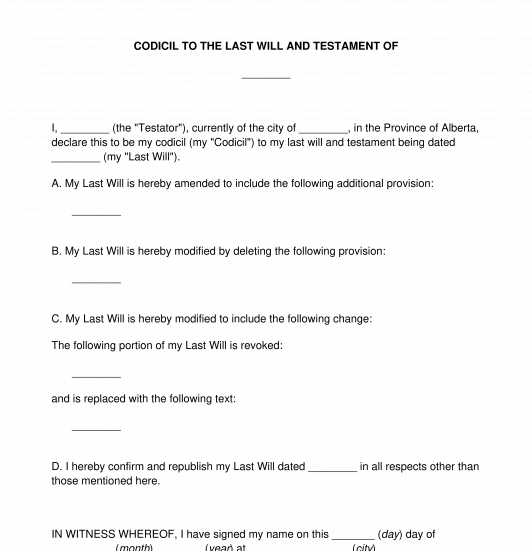 30/09/2025
30/09/2025

Answer a few questions and your document is created automatically.

Your document is ready! You will receive it in Word and PDF formats. You will be able to modify it.




Rating: 4.5 - 88 votes
Fill out the templateA Codicil to Last Will is a document used to make minor changes to an existing Last Will and Testament. This document is used when the person who created the Will, known as the Testator, does not want to create an entirely new Will to make minor changes, such as adding, deleting, or changing an existing provision. This document simply amends the Will to make the relevant minor changes while leaving the remainder of the Will intact. A Codicil can change either one provision of the Will or multiple provisions of the Will. The Codicil is considered a separate legal document from a Will. However, the documents are almost always stored together as the meaning of one document is affected by the presence of the other.
Common reasons why an individual might make a Codicil include:
How to use this document?
A Codicil makes frequent reference to the original Will that it is amending. Therefore, the Testator should have access to a copy of the Will that they can make reference to as they are creating the Codicil. When at all possible, the exact text of the provision that is being deleted or changed should be included in the Codicil. The Codicil gives the Testator the following three options for changing their Will:
Once the Testator makes all of the necessary changes, they should number and initial the bottoms of the pages by hand, and then date and sign the document in the presence of two witnesses. For a Codicil to be formally valid, it must be signed by the testator and two witnesses at the same time in the presence of each other. The witnesses must not benefit under the Will or the Codicil. The two witnesses should also date and sign the document. Additionally, a notary may complete any other necessary paperwork to authenticate the legitimacy of the Codicil.
When the Codicil has been completed and signed, it should be kept in a safe place such as a personal safe or a bank safety deposit, along with the original Will. The Testator can also choose to make copies of the Codicil to their Executor and any other parties who had copies of the original Will.
Applicable Law
As with Wills, the creation of a Codicil to Last Will is a matter of provincial and territorial law. Codicils are interpreted based on the provincial or territorial court where they are probated by a judge when the Testator passes away.
How to modify the template?
You fill out a form. The document is created before your eyes as you respond to the questions.
At the end, you receive it in Word and PDF formats. You can modify it and reuse it.
Guides to help you
Codicil to Last Will and Testament - Sample, template
Country: Canada (English)